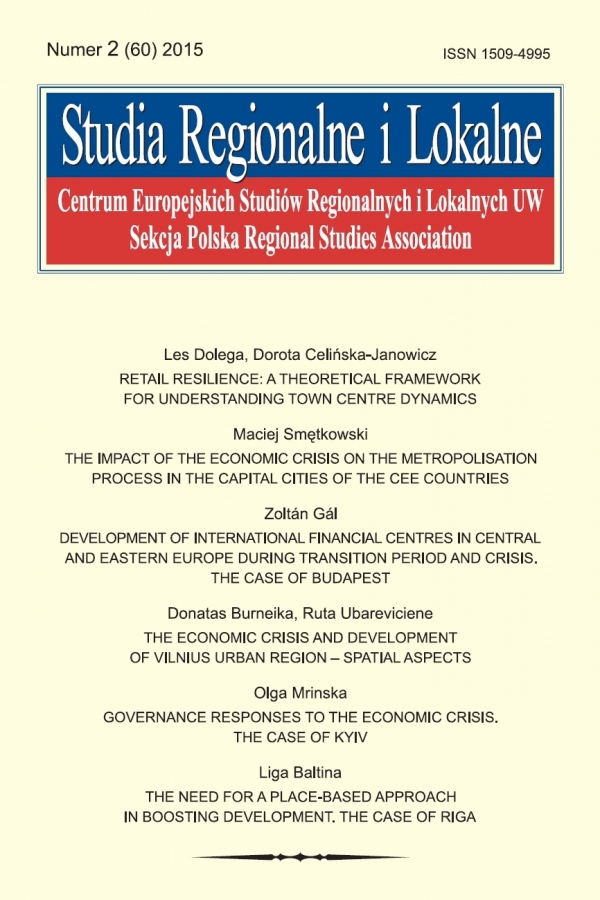Issue:
2(60)/2015
Donatas Burneika, Ruta Ubareviciene
The economic crisis and development of Vilnius urban region – spatial aspects
DOI: 10.7366/1509499526004
Kryzys gospodarczy a rozwój regionu miejskiego Wilna – aspekty przestrzenne
Ostatni kryzys gospodarczy, który miał negatywny wpływ na większość krajów europejskich odcisnął swoje głębokie piętno również na procesie rozwoju Litwy. Oddziaływanie kryzysu było jednak dość zróżnicowane przestrzennie, a poszczególne układy lokalne ucierpiały w różnym stopniu. Branże gospodarcze najsilniej dotknięte kryzysem są skoncentrowane w obszarach metropolitalnych, co oznaczało najpoważniejszy regres gospodarek dużych miast. W artykule autorzy pytają przede wszystkim o to, w jakim stopniu ucierpiała gospodarka Wilna. Z uwagi na to, że poszczególne sektory i obszary miasta ucierpiały na skutek kryzysu nierównomiernie, jego wpływ na przestrzeń miejską jest mozaikowy. Głównym celem podjętej analizy była ocena tego, jak w obliczu kryzysu zachował się sektor budowlany oraz rynek mieszkaniowy. Artykuł przedstawia te zjawiska w kontekście rozwoju całego regionu miejskiego Wilna, a zatem w ujęciu znacznie wykraczającym poza granice administracyjne miasta. Odporność na gospodarcze trudności jest bowiem pochodną reakcji zarówno gospodarki miasta, jak i jego regionalnego otoczenia lub zaplecza. Proces przekształcania obszarów wiejskiej w region miejski w otoczeniu dużego miasta ma charter ciągły i zależy od sytuacji miasta, kraju i globalnej. Skłania to podjęcia próby oceny dalszego rozwoju regionu miejskiego Wilna.
The economic crisis and development of Vilnius urban region – spatial aspects
The development of Lithuania was deeply affected by the recent world economic crisis, which had a negative impact on most countries in Europe. However, the degree of impact was quite differentiated spatially, and various localities suffered from the crisis unevenly. The economic sectors that suffered the most in Lithuania, were concentrated in metropolitan areas, so the crisis damaged urban economy most seriously. How the economy of the capital city was affected at this time is a central question for researchers. Different areas and sectors of the urban economy were affected differently, so the impact on urban space was fragmented. Our analysis is mainly seeking to understand changes in the construction sector and housing market. The paper also tries to reveal the main features of the development of the whole Vilnius urban region, which occupies much wider territories than the city municipality. The capability to withstand economic threats depends both on urban economy and on the situation in the surrounding region or hinterland of the city. The process of the transformation of rural areas into urban regions is constantly taking place and in the case of metropolitan regions, it depends on the situation in the urban, country, and global economies. The rise of discussion about possible paths of prospective development of the Vilnius city region is also among the tasks of this paper.
Affiliation:
Donatas Burneika: Lithuanian Social Research Centre, A. Gostauto st. 11, LT-01108 Vilnius, Lithuania;
donatas.geo@gmail.com 


